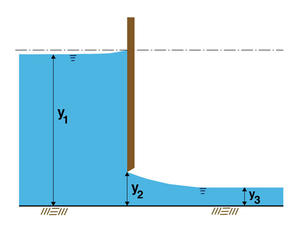|
Derivation of equation for unit-width discharge under a sluice gate
Let:
• y1 = headwater depth, i.e., flow depth upstream of sluice gate, under parallel flow.
• y2 = gate opening, or flow depth at sluice gate, under non-parallel flow.
• y3 = tailwater depth, i.e., flow depth downstream of sluice gate, under parallel flow.
The conservation of energy between headwater and tailwater depths:
• y1 + [v12/(2g)] = y3 + [v32/(2g)]
By conservation of mass:
• q = v1y1 = v3y3
• y1 + [q2/(2gy12)] = y3 + [q2/(2gy32)]
• q = y1 y3 [2g/(y1 + y3)]1/2
To express this equation in terms of the
gate opening y2,
a contraction coefficient is defined:
• Cc = y3/y2
• q = {Cc/[1 + Cc (y2/y1)]1/2} (2gy1)1/2 y2
Defining a discharge coefficient:
• Cd = Cc/[1 + Cc (y2/y1)]1/2
• q = Cd (2gy1)1/2 y2
Defining a reference velocity:
• v2 = Cd (2gy1)1/2
The unit-width discharge under a rectangular sluice gate is:
• q = v2 y2
The contraction coefficient Cc varies within a narrow range, between 0.598 and 0.611.
A value of Cc = 0.61 has been recommended for practical use
(Henderson: "Open channel flow," MacMillan, 1966).
|
